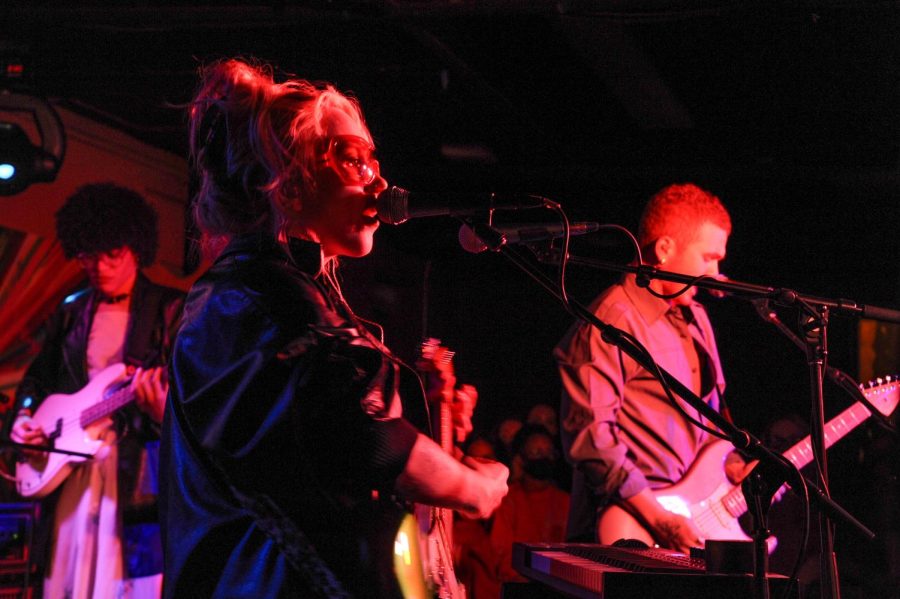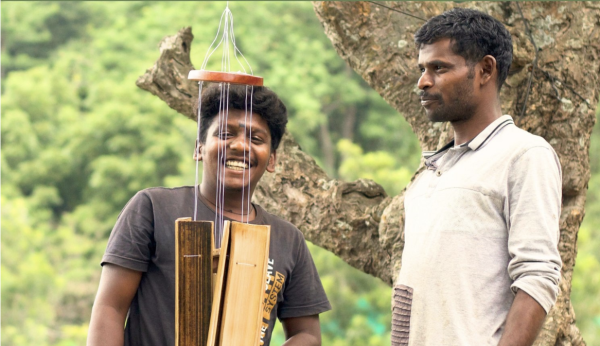Girlpool’s Nostalgia Invoking Farewell Marked by ’Sco Concert
Photo by Erin Koo, Photo Editor
Girlpool plays a show at the ‘Sco.
This past Monday, LA-based indie rock group Girlpool graced the ’Sco with its third-to-last performance as a band. Led by friends Avery Tucker and Harmony Tividad, the group formed in 2013, releasing its debut album Before the World Was Big in 2015. Forgiveness, Girlpool’s latest album, came out this April and recieved a 7.6 rating on Pitchfork.
In August, the band announced it would break up at the end of the year. Two-thirds of the band’s tour dates were canceled, leaving only eight of the initial 23.
“This upcoming tour will be our last one,” the band wrote in a statement announcing its breakup. “It will be an ode to the past, a celebration for the future, and something we will pour both of our hearts into completely.”
I knew two Girlpool songs before Monday night: “Before the World Was Big” and “Chinatown,” both off the band’s debut album. I knew those tracks from high school and hadn’t listened to them much since, though I still held a quiet appreciation for them. With a little variation, I imagine the majority of the audience at Monday night’s show might say the same thing: that they only knew a few songs from an early record. Perhaps, like me, they gave the band’s latest album or two a listen in preparation for the show. Forgiveness wasn’t for me — I’d describe it as bad hyperpop, wearing its Charli XCX-esque influences on its sleeve. I mostly hated the admittedly raw, real lyricism for its content: themes of disappointing sex and too much partying. I think I hoped that Tividad and Tucker, now both in their late twenties, might have matured from the pleasantly teenage whining and vulnerability of Before the World Was Big.
The audience at the show seemed disinterested in the new works, more often chatting over the concert than reverently dancing. If we all only know a handful of tracks from an album released seven years ago, why was the turnout for Girlpool so great?
“Knowing that it was their third-to-last show, I liked the idea of being able to say, ‘I saw indie pop icon, cult-ly loved band Girlpool, in one of their last shows!’ even though I’m not their biggest fan,” Anisa Curry Vietze, OC ’22, said of the show. “I feel like it was a good pick for an Oberlin show; I feel like it was a very Oberlin band, and I bet a lot of people listened to them in high school. But also, I feel like sometimes you just go to the ’Sco show because it’s free, and at the ’Sco, and it’s a Monday night.”
Having music so readily available at our fingertips, and for free, gives students something to do in the midst of classes and assignments.
“All in all, I think I got what I expected: a video for my one second of the day, a brisk walk to the car, and to see Harmony Tividad play the bass. Kind of cool that their drummer is an Obie alum with an English major,” College third-year Sequoia Jacobson said.
Although I kept to the back at the Girlpool concert, I know what it’s like to be in the front row at a ’Sco show for a band you don’t know all that well. It’s a feeling that you are performing as much as the band is — performing to a loving and well-versed audience, dancing to every song joyfully and tirelessly. It’s a small venue, and the artists who come to play for us are just people who hope we love their music.
“I have a theory that your experience at the ’Sco show, any given ’Sco show, is really not about the show itself at all, but instead about your own mental state going in, who you see there, and how much you want to be in a crowded bar-like experience,” Curry Vietze said. “All that is to say, I don’t know that I loved the songs that they were playing necessarily, although I didn’t dislike them either, but I still had a good time because I was with people that I really care about, and in a space that … still means a lot to me.”
Tucker, who came out as a transgender man following the release of the band’s sophomore album in 2017, wrote an essay for Them about the struggle with identity that has come alongside Girlpool’s identity and its past success.
“I felt so distraught over my identity in Girlpool,” Tucker wrote. “The name of the project was gendered, our voices intertwined in a way I couldn’t imagine reinventing. Girlpool was my whole life, passion, journey, and career.”
As artists rightfully grow up and out of their old music, though, the audience still holds onto it dearly. I still love the two songs I know. It’s a nostalgic, tender love, particularly for “Chinatown,” a raw and sparse song about uncertainty and loving your friends. Listening to the track, I feel transported back into my sophomore year of highschool, driving around town in the passenger seat of my first girlfriend’s Prius, staring down at my checkered slip-on Vans. It’s not the kind of music I like now, but I honor it for the place it once had in my life.
“The one main song that I really wanted them to play — and they actually did — I knew because of my experience at Oberlin, because I have so many memories of my freshman year roommate playing it on her guitar in our Dascomb dorm room,” Curry Vietze said. “So it was actually really sweet for me, now as a graduate, an alum, to be able to see them at Oberlin.”











